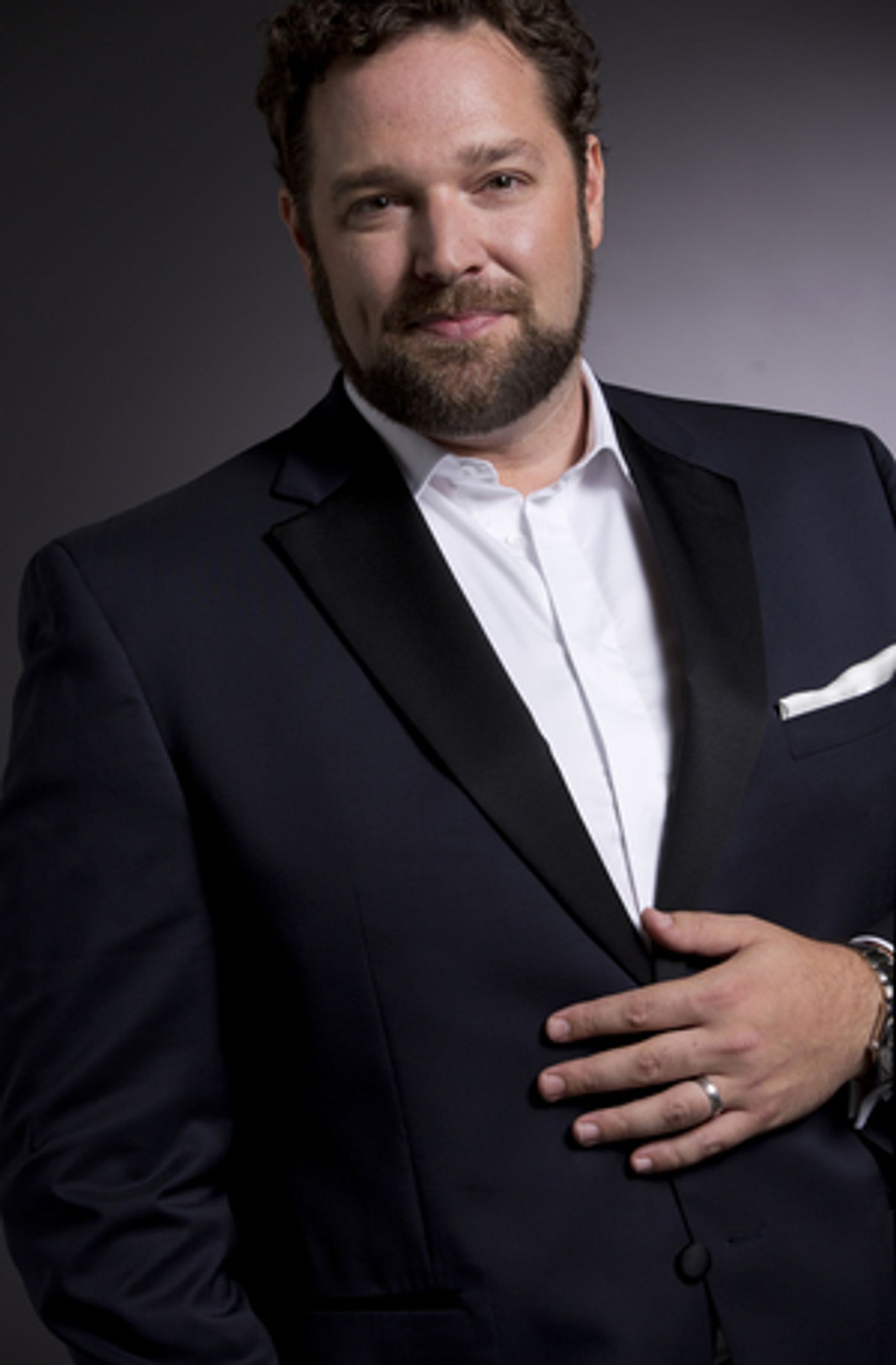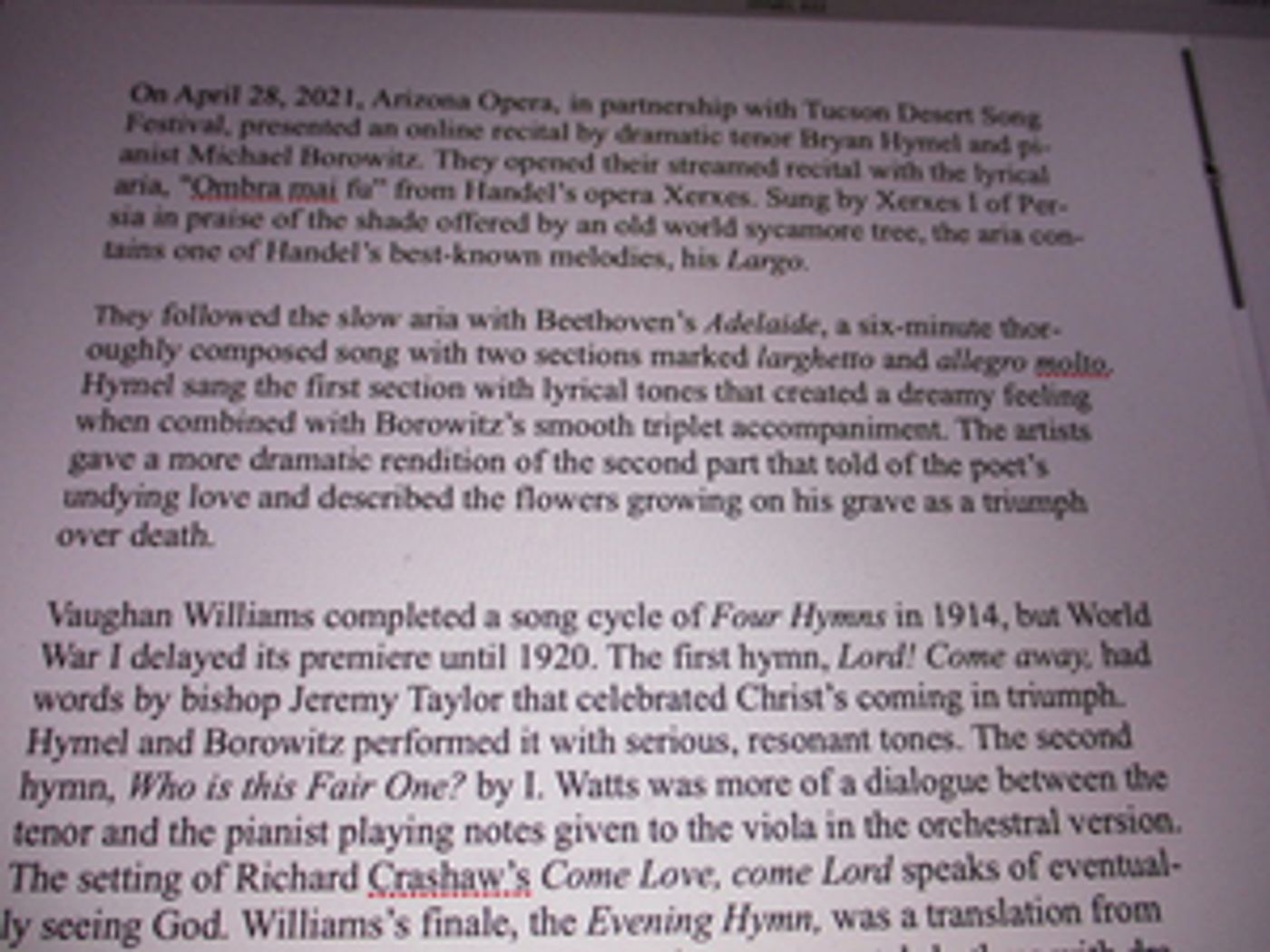Review: BRYAN HYMEL RECITAL FOR ARIZONA OPERA AND TUCSON DESERT SONG FESTIVAL
Dramatic Tenor Sings Robust Arias from Favorite Operas and a New Delight

 On April 28, 2021, Arizona Opera, in partnership with Tucson Desert Song Festival, presented an online recital by dramatic tenor Bryan Hymel and pianist Michael Borowitz. They opened their streamed recital with the lyrical aria, "Ombra mai fu" from Handel's opera Xerxes. Sung by Xerxes I of Persia in praise of the shade offered by an old world sycamore tree, the aria contains one of Handel's best-known melodies, his Largo.
On April 28, 2021, Arizona Opera, in partnership with Tucson Desert Song Festival, presented an online recital by dramatic tenor Bryan Hymel and pianist Michael Borowitz. They opened their streamed recital with the lyrical aria, "Ombra mai fu" from Handel's opera Xerxes. Sung by Xerxes I of Persia in praise of the shade offered by an old world sycamore tree, the aria contains one of Handel's best-known melodies, his Largo.
They followed the slow aria with Beethoven's Adelaide, a six-minute thoroughly composed song with two sections marked larghetto and allegro molto. Hymel sang the first section with lyrical tones that created a dreamy feeling when combined with Borowitz's smooth triplet accompaniment. The artists gave a more dramatic rendition of the second part that told of the poet's undying love and described the flowers growing on his grave as a triumph over death.
Vaughan Williams completed a song cycle of Four Hymns in 1914, but World War I delayed its premiere until 1920. The first hymn, Lord! Come away, had words by bishop Jeremy Taylor that celebrated Christ's coming in triumph. Hymel and Borowitz performed it with serious, resonant tones. The second hymn, Who is this Fair One? by I. Watts was more of a dialogue between the tenor and the pianist playing notes given to the viola in the orchestral version. The setting of Richard Crashaw's Come Love, come Lord speaks of eventually seeing God. Williams's finale, the Evening Hymn, was a translation from the Greek by Robert Bridges. Hymel sang its contrapuntal rhythms with dramatic expression while Borowitz played its seven-note ostinato with bell-like sounds.
Then the artists performed a group of arias. Although Hymel is best known for his French dramatic roles, he proved he can sing a great deal more. For the aria "Donna non vidi mai" ("Woman I have never seen before") from Puccini's Manon Lescaut, Hymel supplied bronzed tones that matched his apotheosis of the beautiful young girl. The selection from Puccini's Turandot was a bit of a surprise since so many tenors sing "Nessun dorma." Here, Calaf faces execution if he does not solve Turandot's three riddles. He tells Liu not to cry for him. With Puccini's sonorities, Hymel and Borowitz presented a fascinating picture of ancient China.
In Verdi's opera, Otello, the title character tells God of his struggle dealing with Desdemona's unfaithfulness. Unfortunately, he never considers the possibility that Iago is lying about her. Hymel is a most believable Otello and I would like to see him do the role onstage.
In Wagner's Die Walküre, Siegmund sang not only of the winter storms through which he has come to find Sieglinde, but also of spring and their budding love. It was a dramatic moment and Hymel supplied a strong, masculine, robust voice rode comfortably on the equally robust accompaniment.
While Verdi's Otello and Wagner's Die Walküre are familiar to many opera fans, Massenet's Herodiade is much less well known. In the opera's last act, John the Baptist sings "Ne pouvant reprimer les elans de la foi" ("Unable to suppress the impulses of the Faith"). When the executioner announces his death, Salomé stabs herself and curses her mother, Hérodiade. This is Hymel's meat. He and Borowitz showed their audience some exquisite French operatic drama.
In contrast to dramatic arias, Hymel and Borowitz finished with a group of four light and tuneful Italian songs: Bixio's "Parlami d/Amore, Mariu;" DeCurtis's "Non ti scordar di me;" Leoncavallo's "Mattinata" and DeCurtis's "Torna a Surriento." That was a good, joyous finale to an otherwise strongly dramatic recital.
The Bryan Hymel Recital is available on an on-going basis. Orders to view it may be placed at ondemand.azopera.org. for a purchase price of $20.
Photo of Bryan Hymel courtesy of Arizona Opera.
Reader Reviews
Videos

